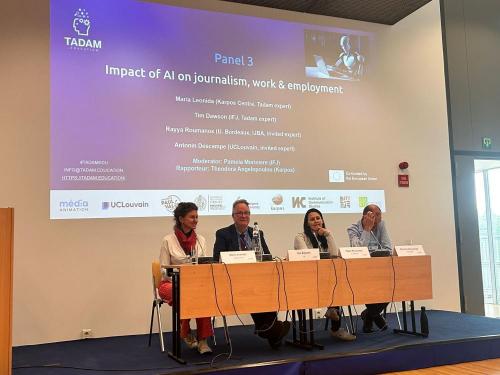
https://www.ifj.org/media-centre/news/detail/category/press-releases/art...
TADAM - Tools & Awareness about Disinformation, Algorithm and Media is an EU funded project aimed at bringing together the sectors of media education, research, journalists’ unions (IFJ), and teachers to reflect on challenges, best practices and educational resources on artificial intelligence and media.
The first event held on 12-13 June at UCLouvain in Belgium brought together researchers, acamedics, journalists and media educators to identify core challenges raised by Artificial intelligence in the media.
Discussions on 12 June addressed AI in media literacy, AI social use, political manipulation and bias and journalism.
IFJ’s panel on AI and journalism was an opportunity to explore ongoing challenges facing journalists, universities and newsrooms in incorporating AI in their daily practices.
Panelists pointed in particular at the need to keep a human decision behind AI works, reflect more on authentication of work, a crucial task which remains difficult to put into practice. Emphasis was put on the need to take consumers’ needs into consideration when trying to expand AI in daily news. Disparities between local and national media in terms of access to innovation and their impact on audiences was also raised.
The lack of willingness of students to use AI and the ambivalence of newsrooms towards its adoption, as well as the importance of training journalists were identified as key concerns.
“AI has the capacity to profoundly reshape the economics, work practices and output of the news media. Journalists’ unions have always played a critical role promoting professional ethics and ensuring that media working practices are consistent with responsible reporting. AI poses profound challenges – TADAM is already proving to be an effective means to understand those and devise effective strategies to meet them”, said Tim Dawson, Deputy General Secretary of the IFJ.
Other participants at the seminar expressed a broad range of views on the subject.
Professor Matthew Montebello, professor of artificial intelligence at the University of Malta said: “AI is like a knife, it can be used in good ways and bad ways. You need to upskill yourself. If, as a teacher, you are giving students an assessment that could be completed using AI, then you are giving them the wrong assessment.”
Maria Ranieri, from the University of Florence said: “AI tends to reproduce stereotypes, so we need to pay attention to this problem. We should also focus on AI in the decision making process. Action is independent from intelligence. We need regulation because AI has the capacity to impact the nature of our citizenship.”
Daniel Bonvoisin, an AI expect from Media Animation said the news media was dramatically overstating the likely impact of AI. “The media is producing panic about AI. All we read in the newspapers is that AI is a threat to humanity. The real issue is not AI itself, but the endless speeches we hear about its likely impact.”
Discussions on 13 June addressed TADAM’s partner methodologies to assess the impact of AI on journalism.
As part of the project’s activities, the IFJ will run a one day workshop in the Balkans on 2 october 2024. The workshop will enhance the knowledge and skills of journalists on existing AI tools besides studying the existing legislations and codes of conduct in the targeted countries (Serbia, North Macedonia and Montenegro) to help unions in the Balkans adopt strategies to best respond to AI developments.









